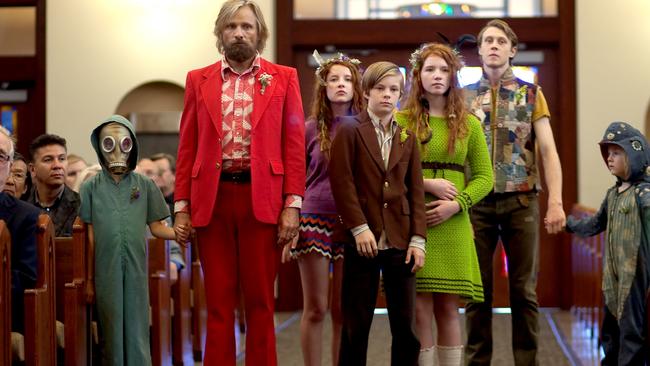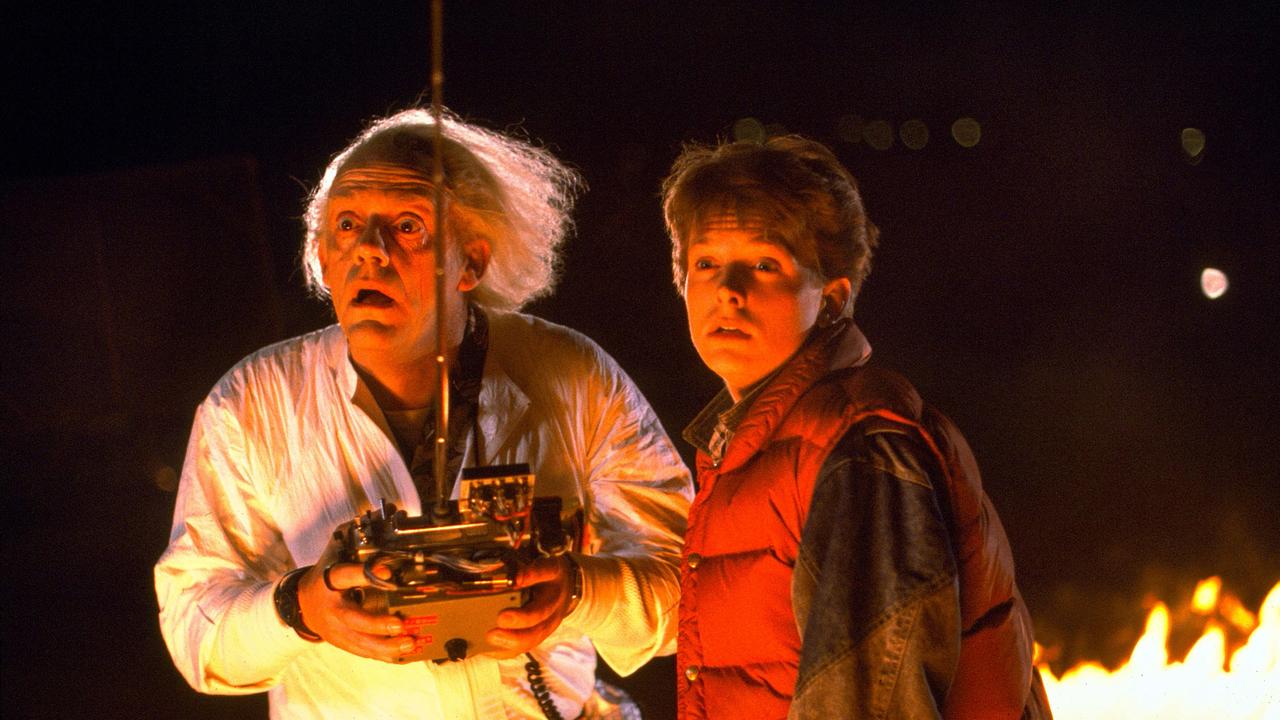Viggo Mortensen goes off the grid for film Captain Fantastic
Captain Fantastic star Viggo Mortensen explains why he goes out on a limb in preparing for challenging roles.

Viggo Mortensen is one of life’s perpetual over-researchers. In fact, the Oscar-nominated actor has a reputation for “going deep’’ as he prepares for his big-screen roles. While in New Zealand filming Lord of the Rings — the epic trilogy that made him a household name — he was ordered by the police “not to walk around town brandishing my sword’’. He had just finished rehearsing a stunt sequence and alarmed Wellington residents by waving his sword about on the street, “thrusting and parrying’’ in an imagined encounter with orcs.
For post-apocalyptic film The Road, Mortensen reportedly slept outside in sub-zero temperatures wrapped in a tarpaulin. He soaked his shoes before walking in front of the cameras, as if the frozen landscape populated by hungry cannibals wasn’t grim enough.
In order to prepare for his latest film, Captain Fantastic, Mortensen subjected himself to another apparently enriching, hair-shirt experience — he gave his hotel room a miss, and camped in the rain-soaked pine forests of the northwestern US, where the film is largely set. One of the film’s producers, Lynette Howell Taylor, says: “We rented a hotel room for him, but he never stayed there. We just knew he was in the forest somewhere. That kind of commitment really shows in his work.”
In a phone interview with Review, the actor known for his superior bone structure, electric blue eyes and un-Hollywood-like interests (poetry, painting, South American soccer) says he used to live in rural Idaho, so “those kinds of forests, those kinds of trees, that kind of weather, animals and so forth are familiar to me’’. He feels “at home and happy’’ in those environments, as his father grew up in the Danish countryside (his mother was American) “and at a very early age he taught me to hunt and fish and we went camping a lot’’.
Even before Captain Fantastic rehearsals began, he and the six child actors who comprise his on-screen family worked on the survival skills depicted in the film, from skinning animals to martial arts training and abseiling down a sheer cliff face. “There were a lot of things we had to practise together and that helped us bond,’’ he says. During that time he lived in the family’s teepee, tending the garden and introducing his own canoes, bikes, books, even kitchen utensils to the set. “I wanted it to be as real as possible,’’ he says, “so that when you saw us living in that way, that it was credible. It wasn’t some fake movie thing … The more real that was, the more interesting and real the contrast would be with other ways of living.’’
Captain Fantastic is not, as its title suggests, a superhero film turbocharged with special effects, but an offbeat family drama propelled by a dark, almost anarchic humour. It centres on Ben Cash, a leftie, hippie-ish father of six who is raising his kids in the forest far away from the pitfalls and temptations of modern life — mobile phones, computers, shopping malls, school and fast food are all off-limits to the Cash brood. Instead, in their forest idyll the children run and climb like elite athletes, hunt and fight like warriors and sound like Harvard graduates as they hold forth on everything from the US constitution to literary classics and the theory of quantum entanglement.
They celebrate Noam Chomsky Day rather than Christmas, steal from supermarkets and get around in a family bus. The seven-year-old, meanwhile, is encouraged by his father to read The Joy of Sex.
Cash, it seems, is into extreme parenting. Yet initially, Mortensen insists, this character is in some respects an “ideal’’ parent. “He’s present, mentally and physically — that already is a good start as far as just being involved in your kids’ lives and being a conscious parent [is concerned]. I think that his particular parenting model, which is based on complete honesty, brutal honesty, constant curiosity and the promotion of open discourse, with all opinions being equally considered, is ideal, it’s great.’’
Really? Won’t audiences find a parent who encourages his kids to steal a polarising figure? “He certainly makes mistakes and he has to come to terms with them at a certain point in the story,’’ the actor concedes.“[But] there are many things that are commendable … People are loath to speak honestly and in a natural way about sickness, illness, death, sex. Even talking about or seeing the human body is [treated as] taboo, and this causes more problems than it solves.’’ Nudity isn’t a problem for Mortensen, who briefly appears starkers in the movie and remarks to stunned passers-by: “It’s just a penis. Every man has one.’’
The children’s off-the-grid paradise is rocked by the news their mother, who is bipolar, has killed herself. In his typically brutal way, Ben tells the children in a flat monotone: “She finally did it. Your mother is dead … Nothing is going to change.’’ His one rebellious child (played by the talented young Australian Nicholas Hamilton) is so distressed, he drives a knife into the wall of the family yurt.
Ben’s in-laws blame him for their daughter’s death and warn him to stay away from her funeral. Which can only mean one thing: Cash will go to the funeral, uninvited, unwanted and unorthodox in a bright red ensemble his father-in-law will compare to a clown suit. A custody battle of sorts ensues along with a secret exhumation, and a bizarre Cash-style ceremony in a public toilet — a vehicle for the film’s almost savage humour.
Interestingly, even Mortensen found some of the gags slightly shocking. “It is funny,’’ he says of the script, chuckling softly. “When I read the script I laughed out loud, and then sometimes I laughed in a different way — more sort of uncomfortable. Sometimes I’d be slightly shocked at some of the things that were said but were meant to happen. And then I was very sad and also surprised at the turn of events and how things evolved with the family. I really liked that aspect of the film — that’s what makes it so complex and so unusual … But the humour comes out of very real circumstances, by playing it for real, it’s not slapstick, easy humour, it’s a lived, unexpected humour.’’
In the end, Ben Cash wonders whether his aggressively unorthodox parenting is doing his kids more harm than good. Mortensen reflects that you “watch the movie and ask yourself whether he is the best possible father or the worst possible father. It swings. It’s never one thing. That’s the beauty of the script. At the start of the movie, you could easily think, ‘Well, this seems to be a left-wing fantasy, some kind of liberal utopian fantasy’ … It turns out not to be the case at all, and the model bends.’’ In the end, he says, “the parenting model is not condoned entirely and it’s not condemned entirely’’.
The actor goes on to make the startling declaration that this avowedly alternative widower is “the most complex and layered and emotionally satisfying in terms of the journey of a character, of any part I think I have played’’. Given his CV — which includes an Oscar and Golden Globe-nominated turn in Eastern Promises, a David Cronenberg film about the Russian mafia, and his role as the warrior king Aragorn in The Lord of the Rings series — this is quite a compliment for a film written and directed by relative newcomer Matt Ross. (Captain Fantastic is Ross’s second film after the critically admired 28 Hotel Rooms, and earlier this year it took out the best director prize in the Cannes film festival’s Un Certain Regard competition.)
Raised and educated in the US, Mortensen lives mostly in Spain with the Spanish actress Ariadna Gil. He has an adult son, Henry, and asked whether he drew on his experiences as a parent to play Cash, he answers thoughtfully: “ I think you always draw on your personal experience, no matter what role you play, no matter how far away from your behaviour or body language or attitude it might be ... I certainly haven’t been exactly that kind of parent, though I have tried to be open. So in that regard it did remind me of raising my kid and I did encourage open dialogue. The way we spoke about the body and sex and death wasn’t as brutally honest as Ben engages in, but relatively open.’’
For much of the film, it’s just him and the six child characters (aged from seven to 18) up there on the big screen arguing, swearing, stealing, climbing on a grandparent’s roof, jamming with guitars. “It was great fun,’’ he says, of collaborating with the children. “Fortunately, we found six extraordinary human beings to play those characters.’’ The child actors, he points out, needed to be intellectually precocious, physically brave, and good performers.
Mortensen is multilingual and something of a renaissance man. He runs a publishing house called Perceval Press that publishes his poetry and photography, and work by other artists. In our relentlessly tech-driven age, the actor, now 57, feels strongly about the importance of the written word.
“Oh yeah,’’ he says. “The written word and even the handwritten word. I still send postcards. I hope that it never becomes entirely impossible to put a letter in a mailbox and have it arrive magically on the other side of the world.’’ And for all its benefits, he says technology — the harmful effects of which are alluded to in the film — may be shrinking our attention spans: “Sometimes, yeah. I think people are less patient and their attention span [is shorter]. It also goes with movie going culture. It’s less frequent that people will sit for two hours or three hours and watch a movie that unfolds slowly and in a complex way. Same with novels and poems. People are maybe less patient.’’
Since his lucrative break in The Lord of the Rings, he has had the luxury of being choosy about roles, and has mostly gravitated towards independent films. He reportedly turned down a part in The Hobbit, and has since appeared in some movies for free. “Fortunately, like everyone else involved in Lord of the Rings, because of its success, I had more options,” he says. “I could continue to look for unique stories, original movie stories without a thought for the budget, or the nationality or the genre. I have to say, I’ve always sort of looked at it that way. There are times that if you run out of money you have to scramble and take the best of what you can find, if you are lucky to find something. I’ve never really changed that much.’’
In some ways, he is an actor for our increasingly globalised times. In the French film Far fromMen, released last year, he plays a schoolteacher caught up in Algeria’s war of independence, speaking French, Arabic and Spanish.
“Is there nothing he cannot do?’’ marvelled one critic. In the Argentinian film Jauja, also released last year, he speaks Spanish and Danish and plays a bowler-hatted, 19th-century Danish army captain posted to a Patagonian outpost.
He turned on a thick Russian accent for his Oscar-nominated role as a fixer for a Russian mafia family in Eastern Promises. One of two Cronenberg productions he has starred in, the movie explores the sex trafficking underworld and co-stars Naomi Watts. His character — his criminal CV inked in tattoos across his torso — is involved in a grisly nude knife fight in a steam bath. The New York Times predicted this scene would become “a touchstone for cinema fetishists’’.
A reflective Mortensen, talking about various films he has done since The Lord of the Rings, hopes he will be able to look back “10 or 15 years from now and at least say, ‘Well, that film was a great idea. It might not have turned out perfectly, but sometimes it did turn out really well.’ There’s no such thing as a perfect movie but, you know, many of those recent movies I’ve done — all of them, I think — stand on their own, are well made, had a really good cast.
“I’ve had a very lucky journey, but I haven’t been passive, I’ve been actively on the lookout for stories that would be challenging and different.’’ With its Chomsky-reciting, school-spurning, shoplifting patriarch, Captain Fantastic certainly fits that bill.
Captain Fantastic opens on September 8.



